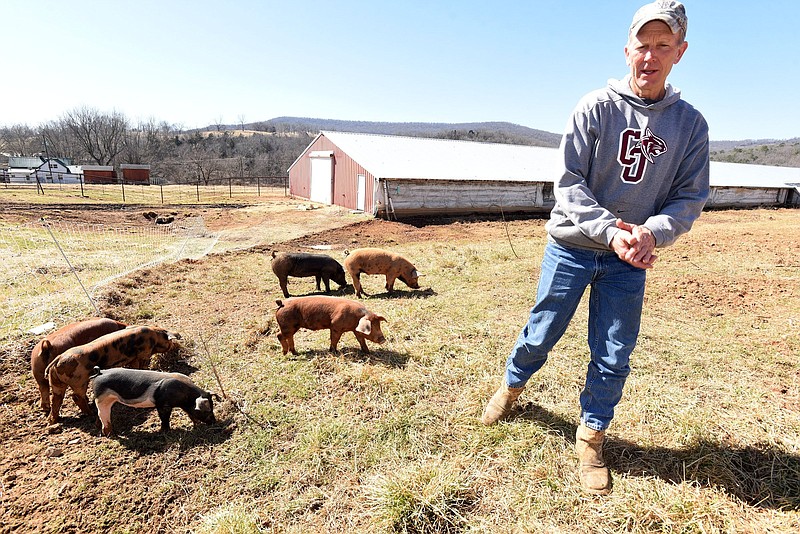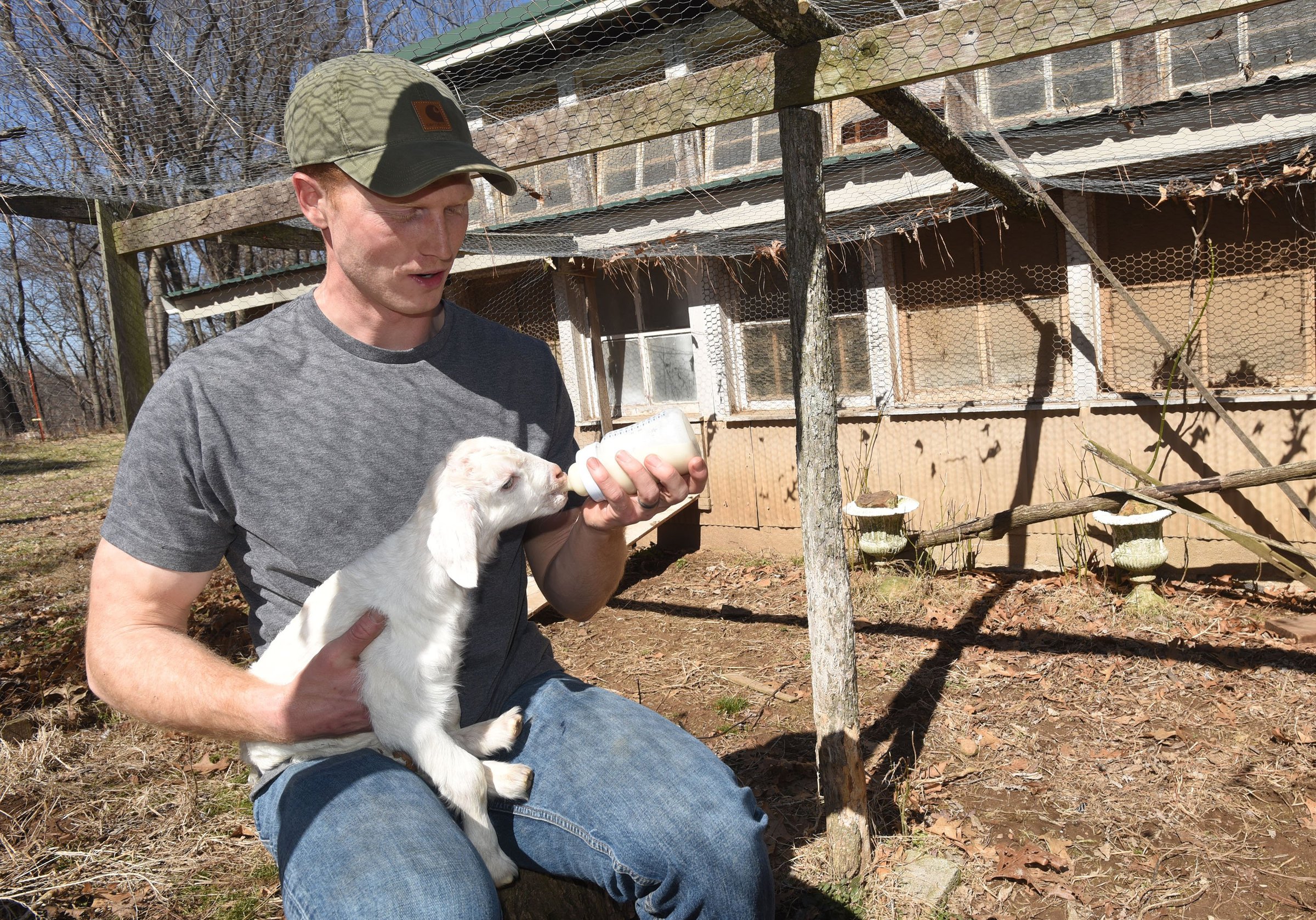Osage Creek Farms, located in the rolling hills of the Ozark Mountains, is doing things differently.
Cattle raised in Arkansas typically graze on a diet of grass or hay before being shipped to a feedlot and sold for slaughter to one of the "big four" meatpackers. The Fry family followed this model for years, but started selling directly to consumers to mitigate market risks and develop closer relationships with their customers.
It also helped when the covid-19 virus began disrupting the economy.
Brent Fry, 58, said the cattle industry has only a few processors to get food to the masses. As production slowed, a backlog of cattle was created and pushed back wait times for processing. This sent cattle prices plummeting and forced ranchers to keep their herds on grass longer or sell them at a reduced cost. Many were competing for spots to get their animals butchered or finished, Fry said.
"It would have been a terrible situation," he said. Selling grass-fed beef, lamb and pork to local grocery stores, restaurants and online shoppers helped keep Osage Creek insulated from effects of the pandemic.
"The cost of materials has gone up, but we don't need that much material compared to what we used to do," Fry said.
Part of that is due to an operational change known as rotational grazing, where farmers move cattle to different portions of pasture throughout the day instead of allowing them to go where they please. This method is known for having environmental benefits and the potential to save ranchers money in the long run. Fry said the farm adopted it out of necessity above all else.
"The finances of the farm weren't good," he said. He remembered writing a check worth about 15% of the farm's gross income to a long-time friend who baled hay for them. To keep doing this was unsustainable, he said.
After switching to rotational grazing, Fry said grass quality improved and enough of it grew to stockpile through the year, lowering material costs.
"To be honest, the pandemic has not been a huge disruption," he said.
Today, weather setbacks, adding water lines and transitioning to raising hogs are the main challenges on the operations side. On the marketing side, Osage Creek is growing.
In the early days of the pandemic, initial shocks affected the business. About 60% of sales went to restaurants and nearly all of that disappeared when closures happened, said Kelton Hayes, 31, who does marketing and sales for Osage Creek Farms. To make up for that, the family focused on direct online sales and saw revenue begin to increase.
"We sold the same amount of beef, but because we were selling it direct-to-consumer, we were making 20% more," said Hayes, Fry's son-in-law.
Other cattle operators struggling with market disruptions have also tried selling their own beef but have run into issues.
"That's difficult in this area because there's not enough processing capacity," said Jeremy Jackson, owner and operator of Jackson's Double J Brangus in Gentry.
In Arkansas, there are only three processing facilities that take cattle, sheep, lambs or hogs and have an inspector from the U.S. Department of Agriculture present, according to the Arkansas Farm Bureau. Efforts to expand and offer more processing options for farmers and ranchers are underway through state and federal grant programs as larger meat companies deal with slower production times during the pandemic.
Jackson said the grant money is nice, but what happens when the pandemic is over and the funds run dry?
The guys running smaller processors struggle to make a living, even though they are booked out, he said.
"I'd like to see more facilities," Jackson said. "I think we can take a couple more facilities. I'ts just scary for things long-term."
Market disruptions in the spring of 2020 affected cattle, hogs poultry and produce as well. Jackson, who owns a few chicken houses, said growers experienced longer out times for birds used in frozen products. Fewer disruptions happened if the birds were used in fresh products. He said he had no trouble on the chicken side, but had to reduce the number of mama cows on his property to make up for the extra cattle.
At Osage Creek, the loss of a Butterball turkey contract rattled the business in 2020. After raising birds for nearly a decade, Fry said a company representative called him over the phone with the bad news.
"He told me it was a performance issue," he said. "I got no feedback on the rankings. When I asked for the information, they told me don't worry about it."
Fry estimated about 20 growers in Carroll County were affected by Butterball's decision.
"It was very abrupt," he said. But the farm was able to weather it.
"If we had been in a conventional agriculture system, the turkeys would have been 75-80% of our income, it would not have been survivable."
Today, the turkey houses are used for farrowing pigs. Butterball did not immediately return messages for comment about the cancelled turkey contracts.
In recent years, inflated commodity and material prices like fertilizers and feed, have weighed on costs and forced ranchers to raise meat prices.
Jackson said he doesn't want to price himself out of business or take advantage of people. Overall, he said shoppers that buy locally-raised beef get a better product at roughly the same price at the meat counter. Jacksons Double J Brangus products are available online.
Osage Creek is part of Grassroots Farmers' Cooperative, a collective of Arkansas farmers and ranchers that raise and sell animal products online to consumers across the country. Hayes said about half of all sales are through Grassroots and half are specific to Northwest Arkansas, coming from places like Ozark Natural Foods.
Despite market fluctuations, Hayes said the last price increase happened five years ago.
"I'm not a very good salesman," he said jokingly.
The farm is preparing for a price increase of 25 cents per pound.
"We want as many people to access our food as possible," he said.
Osage Creek was recently featured on a segment of the Arkansas PBS program "Good Roots," that explored how the farm was recovering from the pandemic. In addition to the hundreds of cows on the farm, there are sheep, goats and pigs on more than 1,700 acres of farmland. There is also access to four miles of the Osage Creek.
"It's important for us to take care of that," Fry said. Land stewardship and efforts to enrich the soil and better the environment for future generations are part of the driving ethos of the farm.


